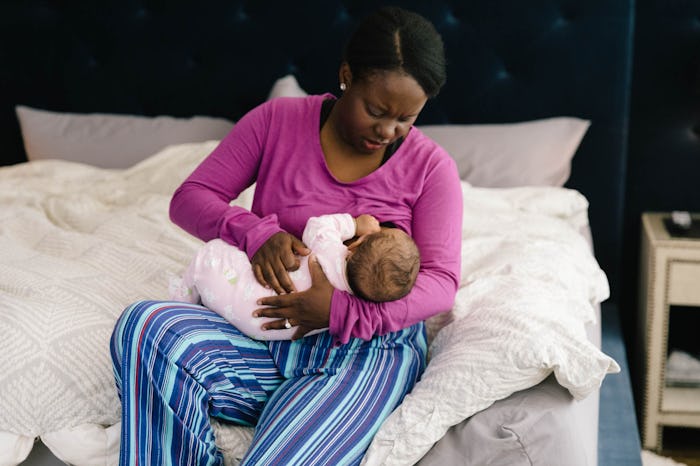Life
Everything You Need To Know About Postpartum Anxiety, According To An Expert
Anxiety and being a brand new parent — they kind of go hand-in-hand, right? It's normal to be worried and nervous, but how do you know when it’s not the typical run-of-the-mill “OMG we don’t know what the hell we’re doing, but we have to keep the baby alive” type of anxiety? When does postpartum anxiety start, and is this different than postpartum depression?
According to Dr. Mayra Mendez, a licensed psychotherapist and program coordinator for intellectual and developmental disabilities and mental health services at Saint John’s Child and Family Development Center in Santa Monica, California, your postpartum anxiety symptoms can actually start as early as when you’re pregnant, before you even give birth. “Symptoms may start during pregnancy, and continue or escalate post-delivery of the baby, and for the first few days, weeks, or up to six months of the postpartum period. Symptoms associated with postpartum reactivity are usually temporary and responsive to treatment,” she says in an email interview.
What’s the difference between postpartum depression and anxiety and what are the symptoms of each? Mendez says, “The difference between anxiety versus depression can be qualified as anxiety is informed by fear and worry, while depression is informed by sadness, low mood, and discontent [emphasis added]. Similarities between anxiety and depression are that both result in emotional dysregulation, they both impair decision making, interfere with perceptions, may impair relationships, and disrupt daily living routines.”
If you're curious about what to look for, it's important to know that the symptoms that classify anxiety and/or depression are the same during the postpartum period as they are if you have anxiety or depression in general. “The postpartum period adds a hormonal variable to the dysregulation of mood and emotions,” Mendez says. “Some women are at greater risk of experiencing postpartum anxiety and/or depression because of the hormonal changes in their bodies, but also because of life changes and demands.” Women who have prior history of anxiety and/or depression are more vulnerable to experiencing postpartum emotional dysregulation.
Yikes. But thankfully, there’s treatment. “Treatment involves psychotherapy of either individual or group therapy modalities, or both. Treatment modalities such as cognitive behavioral therapy, mindfulness-based therapy models, stress management, and medication evaluation are effective options for treating anxiety,” Mendez says. “The most effective anxiety treatments focus on teaching coping skills to manage fears and worry, and promote shifting of negative thinking patterns.”
If you have already been diagnosed with anxiety or depression, make sure your healthcare provider is aware, even before you get pregnant. That way, they can monitor your mental health closely, make suggestions, and even provide medical treatment options or therapy to ensure you have less of a chance of experiencing postpartum anxiety or depression.
